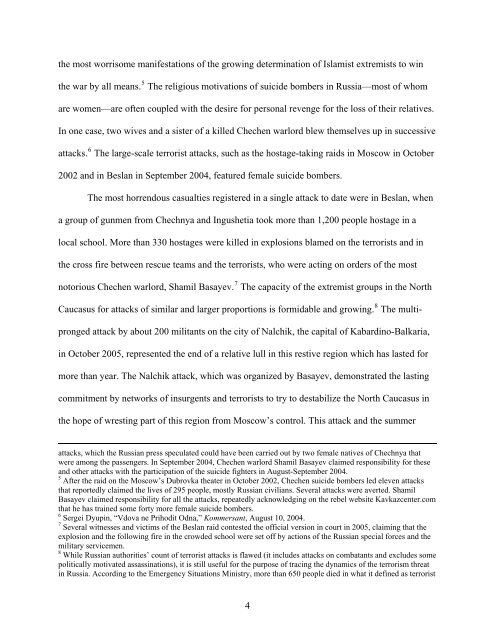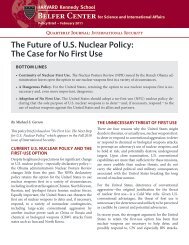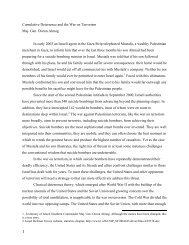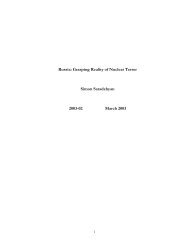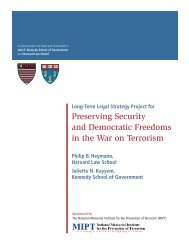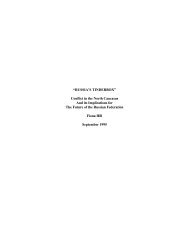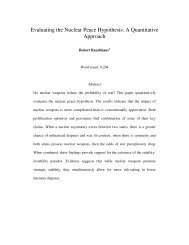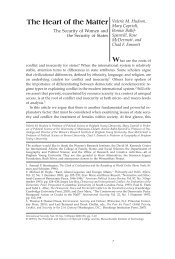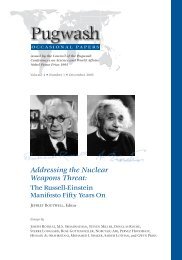Disrupting Escalation Of Terror In Russia To Prevent - Belfer Center ...
Disrupting Escalation Of Terror In Russia To Prevent - Belfer Center ...
Disrupting Escalation Of Terror In Russia To Prevent - Belfer Center ...
Create successful ePaper yourself
Turn your PDF publications into a flip-book with our unique Google optimized e-Paper software.
the most worrisome manifestations of the growing determination of Islamist extremists to win<br />
the war by all means. 5 The religious motivations of suicide bombers in <strong>Russia</strong>—most of whom<br />
are women—are often coupled with the desire for personal revenge for the loss of their relatives.<br />
<strong>In</strong> one case, two wives and a sister of a killed Chechen warlord blew themselves up in successive<br />
attacks. 6 The large-scale terrorist attacks, such as the hostage-taking raids in Moscow in October<br />
2002 and in Beslan in September 2004, featured female suicide bombers.<br />
The most horrendous casualties registered in a single attack to date were in Beslan, when<br />
a group of gunmen from Chechnya and <strong>In</strong>gushetia took more than 1,200 people hostage in a<br />
local school. More than 330 hostages were killed in explosions blamed on the terrorists and in<br />
the cross fire between rescue teams and the terrorists, who were acting on orders of the most<br />
notorious Chechen warlord, Shamil Basayev. 7 The capacity of the extremist groups in the North<br />
Caucasus for attacks of similar and larger proportions is formidable and growing. 8 The multi-<br />
pronged attack by about 200 militants on the city of Nalchik, the capital of Kabardino-Balkaria,<br />
in October 2005, represented the end of a relative lull in this restive region which has lasted for<br />
more than year. The Nalchik attack, which was organized by Basayev, demonstrated the lasting<br />
commitment by networks of insurgents and terrorists to try to destabilize the North Caucasus in<br />
the hope of wresting part of this region from Moscow’s control. This attack and the summer<br />
attacks, which the <strong>Russia</strong>n press speculated could have been carried out by two female natives of Chechnya that<br />
were among the passengers. <strong>In</strong> September 2004, Chechen warlord Shamil Basayev claimed responsibility for these<br />
and other attacks with the participation of the suicide fighters in August-September 2004.<br />
5 After the raid on the Moscow’s Dubrovka theater in October 2002, Chechen suicide bombers led eleven attacks<br />
that reportedly claimed the lives of 295 people, mostly <strong>Russia</strong>n civilians. Several attacks were averted. Shamil<br />
Basayev claimed responsibility for all the attacks, repeatedly acknowledging on the rebel website Kavkazcenter.com<br />
that he has trained some forty more female suicide bombers.<br />
6 Sergei Dyupin, “Vdova ne Prihodit Odna,” Kommersant, August 10, 2004.<br />
7 Several witnesses and victims of the Beslan raid contested the official version in court in 2005, claiming that the<br />
explosion and the following fire in the crowded school were set off by actions of the <strong>Russia</strong>n special forces and the<br />
military servicemen.<br />
8 While <strong>Russia</strong>n authorities’ count of terrorist attacks is flawed (it includes attacks on combatants and excludes some<br />
politically motivated assassinations), it is still useful for the purpose of tracing the dynamics of the terrorism threat<br />
in <strong>Russia</strong>. According to the Emergency Situations Ministry, more than 650 people died in what it defined as terrorist<br />
4


